Even though Hemmati has garnered some attention among Iranian youths in recent days by speaking out on issues pertaining to civil liberties, social freedoms, a mismanaged economy and the nation’s international isolation, it is very unlikely that he can mobilize enough support to present a threat to Raisi.
The Guardian Council, which never publicizes the grounds on which it disqualifies candidates, has thus virtually determined the outcome of the election before people go to polls on June 18 and rendered what could have been a spectacular face-off a fait accompli in favor of the hardliners.
One of the most significant, if not surprising, developments was the disqualification of ex-president Mahmoud Ahmadinejad, who was once an apostle of the hardliners and their ideological sweetheart.
The 94-year-old chairman of the Guardian Council Ahmad Jannati had called Ahmadinejad’s 2006 open letter to the then US President George W. Bush “an aspiration from God,” going so far as to claim that Ahmadinejad was a source of honor for Iran and Islam.
Ahmadinejad, believed to have worked in lockstep with Iran’s security apparatus to manipulate the results of the 2009 presidential election and secure a second term in office, had the unconditional support of the Supreme Leader, the Islamic Revolutionary Guard Corps and religious traditionalists who sometimes likened him to a newly arrived prophet.
But he fell from grace due to internal power struggles, and after being disqualified from the 2017 presidential election never recouped the cherished position the hardliners had conferred on him in early 2000s to become president. He has now cautioned the Islamic Republic that he will not recognize the outcome of the June 18 election and will not vote.
The former firebrand president’s announcement that he will boycott the election represents a striking episode of confrontation between Ahmadinejad and the establishment. Some analysts believe he is struggling to tout himself as an opposition figure.
Raisi, for his part, was routed at the last presidential polls in 2017, in a showdown with President Rouhani. The incumbent was re-elected in a landslide while Raisi garnered some 15.8 million popular votes, equalling 38.3% of the ballots. The turnout in that election stood at 73.3%.
Now, scholars and commentators expect the turnout in this year’s election to be abjectly lower, as the establishment’s priority is to ensure an easy victory for Raisi.
“The reason for disqualification of prominent insiders is that Khamenei did not want to leave anything to chance when it comes to the question of transition to the next Supreme Leader. He was worried that reformists might back up Larijani or Jahangiri and deprive his former student Raisi, whom he has been promoting rapidly over the last few years, of another win, just like in 2017,” said Mehrzad Boroujerdi, director of the School of Public and International Affairs at the Virginia Polytechnic Institute and State University.
“I predict a voter turnout rate of around 37%, if not less. The regime is no longer much concerned about the participation rate as the political engineering I mentioned is of much more significance to them,” he added.
The latest survey by the Iranian Students Polling Agency (ISPA) revealed as of May 27 the turnout will be around 36%, the lowest participation rate in any election since the 1979 revolution.
“Voter turnout is a useful indicator of popular hopes and expectations for the future,” said Shahram Akbarzadeh, convenor of Middle East Studies Forum at Australia’s Deakin University.
“The Iranian leadership has been systematically calling for voter participations, and the Supreme Leader has called voting a patriotic duty and a slap in the face of the United States. Electoral participation is clearly seen as a vote of confidence in the regime as a whole.
“But the Guardian Council’s decision to disqualify so many loyal and high-ranking candidates has made a mockery of the election process, and the public is not blind. Many ask: why waste time and vote? The results will not change anything,” he told Asia Times.
Akbarzadeh, a research professor of Middle East and Central Asian politics argues that Iran represents a form of democracy that is “deceitful, misguided at best” and that “the notion of Iranian democracy has been a PR gimmick used to mock Iran’s arch regional rival, the Kingdom of Saudi Arabia, which holds no elections.”
Luciano Zaccara, a research assistant professor in Gulf politics at Qatar University’s Gulf Studies Center believes the lack of genuine electoral competition is something that even the hardline frontrunner Raisi is concerned about as his anticipated success might give the impression of a staged triumph.
“Lack of real competition and the absence of reformist and pragmatists will reduce the turnout considerably, and even Raisi is worried about winning with a very reduced number of votes and without opposition,” Zaccara said. “But now that the campaign started, nothing else can be done, and the government will have to assume the reduced turnout as well as they accepted the very low rate in 2020 legislative elections.”
This article was originally published on Asia Times

